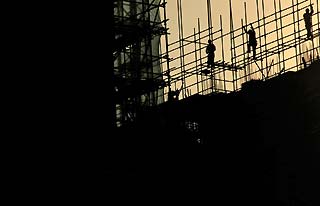Economy growth expected to continue
By Fu Jing (China Daily)
Updated: 2006-07-18 06:53
Economists believe that the country's faster-than-expected growth will
continue in the second half of the year, despite government efforts to slow down
development in some sectors.
|
 |
|
Labourers work on the scaffoldings at a construction site in
Nanjing, capital of east China's Jiangsu province July 13, 2006.
[Reuters] | "Slightly heated" was the phrase that the World Bank (WB) used to describe
the economy in the second quarter, after an investment spree, loose credit
supply, trade imbalance and price hikes of raw materials led them to estimate
growth of higher than 10 per cent.
The year's total GDP growth is also likely to be around 10 per cent and
exceed the government's planned target of 8 per cent, said Zhao Min, an
economist with the WB China Office.
"We believe that China's economy is a little bit heated, but during a
transitional period China can and has released great potential to achieve fast
economic growth," Zhao told China Daily.
China's economy can continue to grow at a "rational speed" of 9-10 per cent
annually for some years to come, Zhao said.
Premier Wen Jiabao said over the weekend that guarding against a rapid rise
in fixed asset investment while keeping economic growth at a relatively stable
pace has topped his work agenda.
He said credit and land supply policies should be strictly implemented and
efforts must be made to limit the growth of energy-consuming and polluting
industries.
The National Bureau of Statistics and the National Development and Reform
Commission (NDRC) will publish half-year data on China's economic and social
development this week.
The State Information Centre, a research organization affiliated to National
Development and Reform Commission, suggested an interest rate hike in the second
half of this year and higher reserve requirements for commercial banks.
"All possibilities will become reality," said Lin Yueqin,
researcher with Economics Research Institute under Chinese Academy of Social
Sciences, anticipating change after the State Council holds its half-year
economic meeting this month.
|